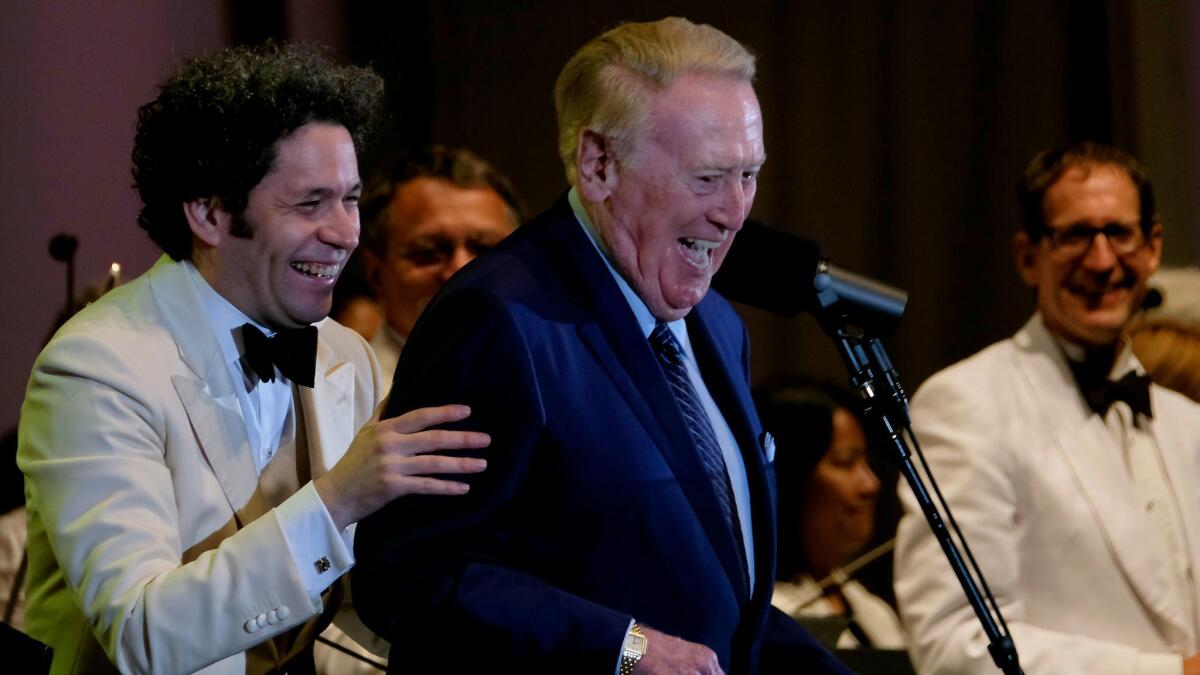Review: Dudamel and Beethoven — and Vin Scully — for the common man

- Share via
“Fellow citizens, we cannot escape history,” Abraham Lincoln said.
It is a line that resonates through Aaron Copland’s “Lincoln Portrait.” Many an uncommon man and woman have read it in performances with proper forceful meaning during the history of Copland’s stirring patriotic justification of the American ideal, a 15-minute oration for narrator and orchestra written in early 1942 in the wake of Pearl Harbor.
Not a word has gone out of date. But ours is such a fragmented whom-do-you-trust age, even Lincoln can be readily and shamelessly misinterpreted. So it proved an inspiration for Gustavo Dudamel and the Los Angeles Philharmonic to invite the most trusted voice in all of L.A. to recite “Lincoln Portrait” at the Hollywood Bowl on Thursday night. The one person we can all agree about. Vin Scully.
I don’t have to tell you whom he is, do I? Having turned sports broadcasting into an art throughout his 67 seasons as a broadcaster for the Dodgers, Scully knows a thing or two about creating dramatic excitement.
He stood tall in a presidential dark blue suit, against the orchestra in summer white jackets and tops, and read Lincoln’s lines with sober conviction. Rather than attempt to make Copland’s climax on “government of the people, by the people, and for the people shall not perish from the earth” sound exciting in the way a World Series home run might, he instead used his familiar voice to simply command attention. A full amphitheater erupted in what felt like the most uncommon of united applause.
At intermission, I overhead, over and over, the speculation about what it would be like if Scully were president. So what if he is 89?
We cannot, of course, escape history. And that was the larger point of this important program, which will be repeated Tuesday. Copland served as a preface to Beethoven’s Symphony No. 9, with which Dudamel had made classical music and L.A. history at the Hollywood Bowl eight years ago. He used his first concert as L.A. Phil music director to give an unprecedented free performance of the symphony at the Bowl in his belief that music, like freedom, is a human right, and to promote his then-new YOLA youth orchestra in the process.
What made this occasion different, other than the fact that this time people bought their tickets (yes, there are still a couple, if too few, sections of dollar seats for those who act fast), is that Beethoven’s Ninth seems to have a particular relevance at the moment. The 65-minute symphony, with its “Ode to Joy” finale that embraces brotherhood, calls for context. What you introduce it with has become a bit of an art in itself.
This spring Jeffrey Kahane helped to bring his tenure as music director of the Los Angeles Chamber Orchestra to a close with a moving talk about Beethoven’s unique ability to convey democratic ideals. Leonard Slatkin prefaced a Detroit Symphony Ninth with John Corigliano’s “Mr. Tambourine Man,” new songs to the lyrics of Bob Dylan classics.
Most recently, in Hamburg, Germany, a performance of Beethoven’s symphony was played at the request of Chancellor Angela Merkel as an inspirational evening out for the Group of 20 summit. Its prelude was merely the march in, under high security, of a peculiarly disparate collection of world leaders.
For Dudamel, though, the night remained all about the people. He opened with Copland’s “Fanfare for the Common Man,” played with magnificent grandeur. Dudamel then went on to bring an arresting broad scope and vitality to “Lincoln Portrait” that set the pointed tone both musically, dramatically and politically for the Ninth after intermission.
Dudamel’s Ninth does not necessarily beg for comparison with his earlier Bowl performance. Too much had changed in his development. Some things were recognizable, but much was not. He has a far greater command of form and nuance. He makes it look incredibly easy.
Maybe the greatest difference is that eight years ago, Dudamel was a 28-year-old idealist making a statement that this symphony was all about us and him. We’re all in it together. What could be better, or more exciting, or more hopeful, than that?
His Ninth has gotten more restrained and refined and more maturely ambiguous over the years. Now, it’s more about letting Beethoven speak for himself and trust in every turn of phrase, from the ethereal opening, to the Scherzo as rhythmically extroverted as Copland, to the heavenly, luminously played Adagio, to the heaven-storming “Ode to Joy.”
The Los Angeles Master Chorale, in that final movement Thursday, was its masterly self. The vocal soloists — Amanda Majeski, J’Nai Bridges, Issachah Savage and Ryan Speedo Green — thrilled.
But Dudamel held them back ever so slightly, as if to show that this symphony is telling us what can and should be, rather than what is. There was a melancholy hint, if ever so slight, in this loving performance, that we are not yet at the point where we can trust Beethoven. Or Scully. Or history.
♦ ♦ ♦ ♦ ♦ ♦ ♦ ♦ ♦ ♦
L.A. Phil: Beethoven’s Ninth, ‘Fanfare for the Common Man’ and ‘Lincoln Portrait’
Where: Hollywood Bowl, 2301 Highland Ave., L.A.
When: 8 p.m. Tuesday
Tickets: $8-$101
Info: (323) 850-2000 or Hollywoodbowl.com
MORE MUSIC COVERAGE:
Gustavo Dudamel gives Misty Copeland the royal treatment at the Hollywood Bowl
L.A. versus Berlin: Which is king of the classical world?
At the Chance Theater, ‘Parade’ marches to the drumbeat of history
More to Read
The biggest entertainment stories
Get our big stories about Hollywood, film, television, music, arts, culture and more right in your inbox as soon as they publish.
You may occasionally receive promotional content from the Los Angeles Times.










